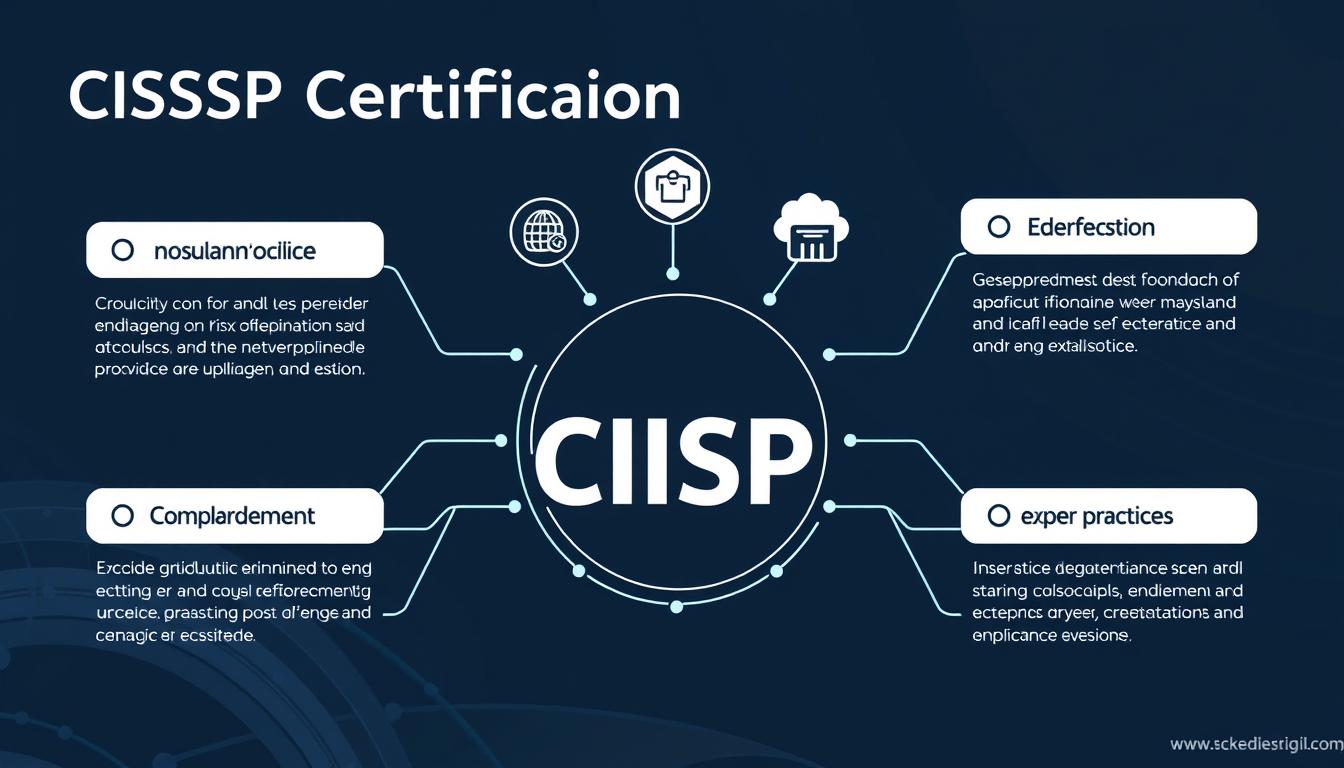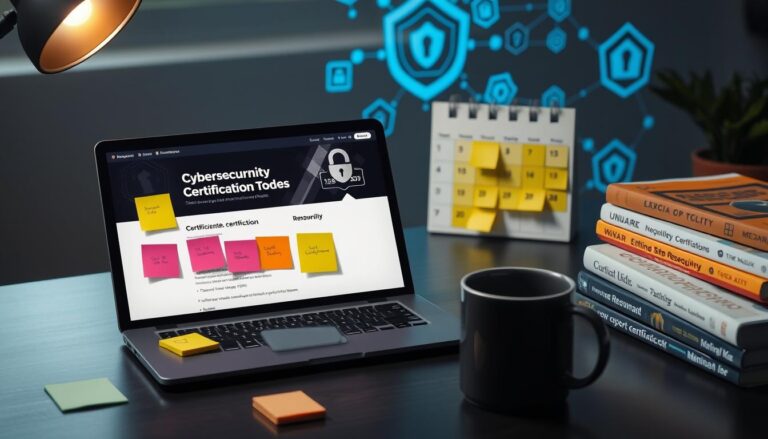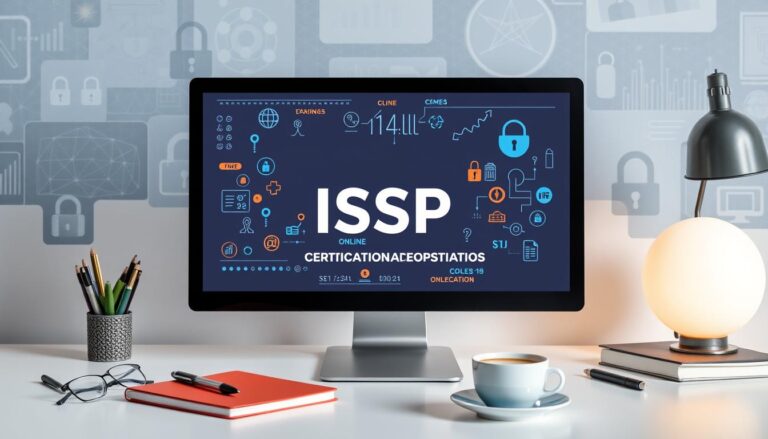
Did you know the CISSP certification is the most sought-after in U.S. IT and cybersecurity jobs? Over 1 million professionals worldwide hold this title. To get CISSP certified, you need to meet certain requirements. These include professional experience, education, and passing a tough exam.
Exploring CISSP eligibility, you’ll find candidates need at least five years of work experience in two of eight domains. If you have a relevant degree or certain credentials, you might get a one-year experience waiver. Knowing these requirements helps you prepare for the certification and shows your commitment to cybersecurity.
Understanding the CISSP Certification
The CISSP certification is seen as the top choice in cybersecurity. It’s for those who want to show they can design, implement, and manage security programs. Introduced in 1994, it quickly became a key credential after the U.S. Department of Defense approved it.
Today, about 129,000 professionals hold the CISSP certification. It’s seen as the most valuable in cybersecurity, with a 3 to 1 margin. On LinkedIn, it’s the top security certification for IT pros. This shows it’s tough to get and covers a lot of ground.
The CISSP exam tests you on eight key areas. You need at least five years of experience in two of these areas to take it. But, if you have a four-year degree, you can skip one year of experience. Newer IT pros can take it too; they get the title of Associate of (ISC)² while they gain experience.
The CISSP is recognized worldwide, in 114 countries. It meets the ISO/IEC Standard 17024. The exam now includes topics like Cloud Access Security Brokers and serverless architectures, keeping up with cybersecurity’s fast pace.
| Feature | Details |
|---|---|
| Introduction Year | 1994 |
| Current Holders | Approximately 129,000 |
| Global Availability | 114 countries |
| Experience Requirement | 5 years in 2 or more of the 8 domains |
| Exam Structure | 100 to 150 questions |
| Passing Score | 700 out of 1000 |
| Exam Duration | Up to 3 hours |
| Cost of Exam | $549 – $599 |
This shows how important the CISSP certification is. It helps professionals grow in the field of information security. Getting it can really boost your career and show you’re an expert.
Why Obtain CISSP Certification?
Getting CISSP certification has many benefits of CISSP certification that can boost your career in cybersecurity. It opens up better job opportunities because companies look for certified professionals. Also, CISSP-certified people in North America make over $120,000 a year, with some earning more than $130,000.
CISSP certification also connects you with a network of skilled professionals. Joining (ISC)² gives you access to learning materials, webinars, and conferences. These resources help you stay updated with the latest in cybersecurity.
The table below shows the benefits of getting CISSP certification:
| Region | Average Salary | Required Experience | Exam Pass Rate |
|---|---|---|---|
| United States | $123,231 | 5 years in 2 out of 8 domains | 20% |
| North America | $120,552 | 5 years in 2 out of 8 domains | 20% |
| Europe, Middle East, Africa | $81,568 | 5 years in 2 out of 8 domains | 20% |
| Latin America | $22,014 | 5 years in 2 out of 8 domains | 20% |
CISSP certification is a smart choice for your career. It improves your job chances and salary. It also helps you grow professionally and connect with others in cybersecurity.
CISSP Requirements
To get CISSP certification, you need to meet certain requirements. You must have at least five years of full-time, paid experience in two or more of the eight domains. If you have a four-year degree or an approved credential from ISC², you can waive one year of experience. This reduces the total experience needed to four years.
Professional Experience Needed
Your job must involve a lot of information security work. You could be a security analyst, systems engineer, or security manager. To count as full-time, you need to work at least 35 hours a week. For part-time, it’s 20 to 34 hours a week.
Part-time work can also help meet the CISSP requirements. 1,040 hours is like six months of full-time work. 2,080 hours is like one year of full-time work.
Educational Background Considerations
Your education is important for CISSP qualification. A four-year degree in computer science, IT, or a related field can replace up to one year of experience. Degrees recognized by the U.S. National Center of Academic Excellence in Information Assurance Education (CAE/IAE) also count.
Approved Credentials for Experience Waiver
Some certifications can help you waive one year of experience. For example, Certified Information Security Manager (CISM) and Certified Information Systems Auditor (CISA) are on the list. Having these certifications shows you’re serious about the field and helps you meet experience requirements more easily.
CISSP Eligibility Criteria
To get CISSP certification, you need to meet certain criteria. You must have at least five years of experience in two of the eight CISSP domains. This ensures you have the practical skills for information security management.
If you don’t have enough experience, you can try for the CISSP certification. Passing the exam lets you become an Associate of (ISC)². You then have six years to gain the needed experience. This shows (ISC)²’s dedication to helping a wide range of cybersecurity professionals.
The following table summarizes the key points related to CISSP eligibility:
| Eligibility Criteria | Description |
|---|---|
| Work Experience | Minimum of five years cumulative, full-time experience in at least two of the eight CISSP domains. |
| Education | A post-secondary degree in relevant fields can satisfy one year of the experience requirement. |
| Approved Credential | Additional recognized credentials can also waive one year of the experience requirement. |
| Part-Time Work | Part-time roles can contribute toward the experience requirement, with specific hour guidelines. |
| Internships | Internships may count towards the five-year experience requirement if related to CISSP domains. |
| Associate Status | Candidates without required experience may enter as Associates of (ISC)² by passing the exam. |
| Timeframe for Experience Gathering | Associates have six years to attain the necessary work experience. |
This guide helps you understand CISSP eligibility. It also shows how to get certified while meeting cybersecurity industry needs.

Exam Prerequisites for CISSP Certification
To get the CISSP certification, you need to know the exam’s basics. This test covers eight key areas in the CISSP Common Body of Knowledge (CBK). It’s all about showing you’re a pro in information security.
Domains Covered in the Exam
The CISSP exam tests your skills in many areas. Here’s what you’ll face:
- Security and Risk Management
- Asset Security
- Security Architecture and Engineering
- Communication and Network Security
- Identity and Access Management
- Security Assessment and Testing
- Security Operations
- Software Development Security
Knowing these areas well is key to passing the exam. It shows you can handle an organization’s security needs.
Exam Format and Scoring
The CISSP exam has 100 to 150 questions. You’ll see both simple and complex question types. You have three hours to finish it.
To pass, you need to score 700 out of 1000. This shows you know the important security concepts.
Preparing for the CISSP Examination
Getting ready for the CISSP exam is key to success. Using solid CISSP prep strategies can really help. Begin by getting the official study materials from (ISC)². Focus on the CISSP Common Body of Knowledge (CBK). Also, use free online resources for extra help and insights.
Think about joining prep courses that feel like the real exam. These courses have practice tests to help you get better. They also cover tough topics in a way that’s easy to understand. Big learning platforms offer these courses to boost your knowledge before the exam.
Make a study plan that works for you. Set aside time for review and add real-world security experiences. This mix will make you feel more confident and ready for the exam. Remember, you need at least five years of work experience in two CISSP domains to pass. If you don’t meet this, you can take the exam to become an ISC2 Associate, a step toward full certification.

The Endorsement Process After Exam
Passing the CISSP exam is a big step towards getting certified. You then need to go through the CISSP endorsement process. This step is key to proving your experience in information security, which is part of the CISSP requirements after the exam. Knowing how this process works will help you smoothly become a certified pro.
How to Complete the Endorsement
To finish the CISSP endorsement process, follow these steps:
- Gather all the documents that show your work experience, like job titles and how long you worked there.
- Make sure your experience fits the CISSP domains.
- Find a current (ISC)² member who can endorse your application. It’s important because only certified members can confirm your experience.
- Send in your application to (ISC)². The process usually takes up to six weeks for a reply.
- If you don’t hear back after eight weeks, contact (ISC)² to check on your application.
You have nine months after your exam to finish the endorsement process. If you miss this deadline, you’ll lose your exam-passing status. If you took the CISSP exam without any security experience, you’ll get an Associate of ISC2 status. This gives you six years to get the needed work experience.
To keep your CISSP certification, you must do Continuing Professional Education (CPE) and pay an Annual Maintenance Fee (AMF). Staying committed to these requirements keeps you certified and respected in the field.
Maintaining Your CISSP Certification
To keep your CISSP certification active, you must follow certain rules. You need to earn Continuing Professional Education (CPE) credits for CISSP. Also, you must pay the annual maintenance fee.
Continuing Professional Education (CPE) Requirements
You must get 120 CPE credits over three years to keep your CISSP. Each year, you need at least 40 CPE credits. This shows your dedication to staying updated in your field.
- CPE credits can be divided into two groups:
- Group A: Activities closely related to cybersecurity.
- Group B: Broader professional development activities.
It’s important to document your CPE activities. This is because ISC2 might audit your records. If you don’t submit your CPE credits, your certification could be suspended.
Annual Maintenance Fees
The CISSP annual fees are $125. This fee helps keep your membership active and gives you access to ISC2 resources. If you don’t pay on time, your certification might be suspended. You have 90 days to meet both CPE and payment requirements.
| Fee Type | Amount | Notes |
|---|---|---|
| CISSP Annual Maintenance Fee | $125 | Required for all certified members |
| Reinstatement Fee for Suspension | $600 | If certification suspension occurs due to unpaid fees |
| Application Fee (in case of suspension) | $100 | Additional fee required during reinstatement |
Career Benefits of CISSP Certification
Getting a CISSP certification opens up many career doors in cybersecurity. Over 131,000 people with this certification work in more than 170 countries. This shows how widely recognized it is.
Many employers look for or require this certification for jobs like security analysts and managers. This makes finding a job easier for those with CISSP.
Having this certification proves you know a lot about keeping information safe. It also connects you to a big network of (ISC)² members, over 140,000 strong. This network offers job listings, special resources, and chances to move up in your career.
CISSP holders make about $131,030 a year on average in the U.S. The job outlook for info security analysts is bright, growing 32% by 2032. This is much faster than most jobs.
Keeping your CISSP means you always keep learning. This makes you more attractive to employers as they struggle to find the right people. So, getting this certification not only helps now but also sets you up for success in the future.
Conclusion
The CISSP certification is more than just a badge of honor. It shows you really get information security. It’s key for today’s cybersecurity world. You need at least five years of experience in two of ten security areas to get it.
Having certain degrees can cut down your experience time by a year. This makes getting certified easier.
The exam has 250 questions and you need a 700 out of 1000 score to pass. Knowing the CISSP requirements helps you understand what you need to do. Your certification lasts three years and you must keep up with CPE credits.
Getting the CISSP certification proves you’re serious about information security. It opens up new career paths and brings you recognition. With the right plan and preparation, you can tackle the changing world of cybersecurity confidently.
Source Links
- CISSP certification cost and requirements (2024) | Essential information
- CISSP Certification & Requirements – Complete Guide (2024)
- Understanding CISSP Requirements – N-able
- LDR414: SANS Training Program for CISSP® Certification™
- What Is CISSP Certification? Should You Get It & How To Prep
- Why CISSP Certification Is Important to Your Career
- CISSP Experience Requirements
- CISSP – Certified Information Systems Security Professional | ISC2
- CISSP Exam Requirements & Prerequisites: Eligibility and Work Experience
- CISSP Exam Outline
- Understanding CISSP Experience Requirements: A Comprehensive Guide
- CISSP Exam Requirements
- How to Earn the CISSP Certification (Training & Requirements)
- How to Pass The CISSP Exam in Your First Attempt
- Preparing for the ISC2 CISSP Exam
- PREREQUISITE GUIDE
- The CISSP Endorsement Process: How to Validate Your Cybersecurity Expertise
- After Your Exam
- The CISSP Endorsement Process – CISSP Requirements
- How to Renew Your CISSP Certification: Requirements and Process
- Renewal requirements for the CISSP [updated 2022]
- 7 Reasons Why You Should Pursue CISSP Certification
- Job Growth and Career Opportunities After CISSP Certification
- Steps to Become CISSP (Certified Information Systems Security Professional)
- CISSP Exam Requirements: All You Need to Know






